Rugby, a sport of power, finesse, and unyielding determination, has witnessed the rise of extraordinary athletes who have left an indelible mark on the game. These players, celebrated for their exceptional skills, profound impact, and unwavering consistency, have forged legendary careers that spanned years, making them true icons of rugby. In this article, we present the top 10 greatest rugby players of all time, considering their remarkable talent, their influence on the sport, and their consistent performances over the years.
The Unifying Criteria
Before we delve into the list of the greatest rugby players, it's vital to understand the criteria that unify them:
1. Skill and Talent
Every player on this list possesses an extraordinary level of skill and innate talent that sets them apart in their positions. These skills are the foundation of their consistency and success.
2. Impact
Beyond their individual brilliance, these players have left an enduring impact on the sport. They have inspired future generations, redefined their respective positions, and have contributed to the global appeal of rugby.
3. Consistency
Consistency is the common thread that weaves these players into the fabric of rugby greatness. Their ability to maintain their extraordinary performances year after year is a testament to their enduring legacy.
The Top 10 Greatest Rugby Players
Now, let's unveil the top 10 rugby players who have exhibited exceptional skill, had a profound impact, and maintained remarkable consistency over the years.
1. Jonah Lomu (Active: 1994-2007)
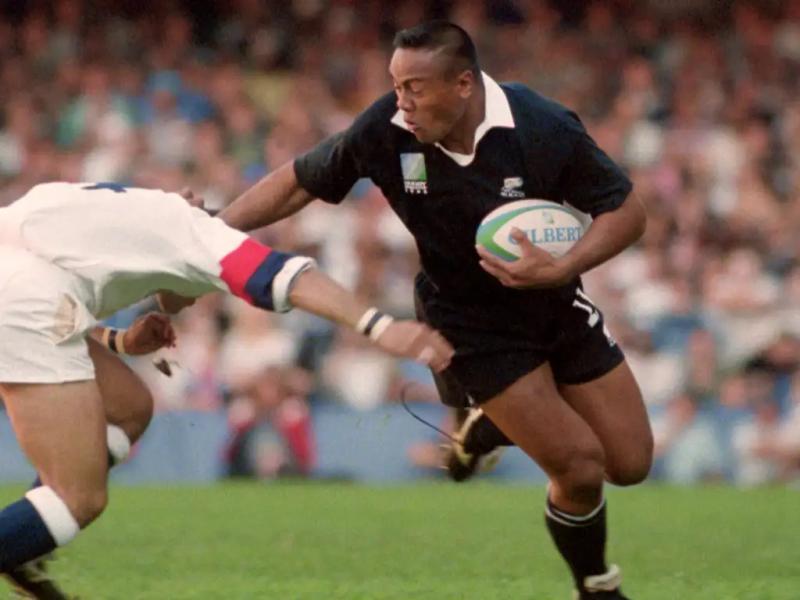
Skill and Talent: Jonah Lomu, a legendary winger, possessed an exceptional combination of skills and natural talent that made him a standout figure in rugby. His incredible speed allowed him to effortlessly glide past opposition players, while his immense power made him a formidable force on the field. However, what truly set Lomu apart was his remarkable ability to score tries. Whether through sheer acceleration or bulldozing through defenders, he had an innate gift for finding the try line. His skill set formed the bedrock of his career and contributed significantly to his status as a rugby icon.
Impact: Jonah Lomu's impact on rugby transcended the boundaries of the sport. In the 1995 Rugby World Cup, he became a global sensation. Lomu's performances in the tournament were nothing short of extraordinary, captivating audiences worldwide. His displays of speed, power, and try-scoring prowess not only helped New Zealand to the final but also introduced countless individuals to the beauty and excitement of rugby. Lomu's influence during that tournament was instrumental in expanding the global appeal of rugby and garnering interest from regions far beyond traditional rugby strongholds.
Consistency: Remarkably, Jonah Lomu maintained a high level of performance throughout his career, even in the face of significant health challenges. His battle with nephrotic syndrome, a kidney disorder, could have derailed the careers of many athletes. However, Lomu's determination and dedication allowed him to consistently deliver extraordinary performances on the rugby field. This unwavering commitment to excellence in the face of adversity is a testament to his enduring legacy as one of rugby's all-time greats.
2. Richie McCaw (Active: 2001-2015)

Skill and Talent: Richie McCaw, a renowned openside flanker, was a master of his craft with extraordinary skills that set him apart in the rugby world. His expertise lay in the breakdown, where he excelled at winning turnovers and disrupting opponents' possession. McCaw possessed an uncanny ability to read the game, anticipate play developments, and position himself strategically to make crucial steals. His relentless work rate and incredible stamina made him a perpetual presence on the field, contributing both defensively and offensively. McCaw's skill set was a testament to his deep understanding of the game and his commitment to excellence in every facet of his play.
Impact: Richie McCaw's influence on rugby is nothing short of legendary. He captained the New Zealand All Blacks to two Rugby World Cup victories, in 2011 and 2015, making him the first captain to achieve this remarkable feat. Under his leadership, the All Blacks exhibited a level of dominance rarely seen in the sport. His ability to inspire and lead by example made him an iconic figure not only in New Zealand but in the rugby world at large. McCaw's impact extended beyond just wins and losses; he instilled a culture of excellence and never settling for anything less than the best within the All Blacks, leaving an indelible mark on the team's legacy.
Consistency: McCaw's exceptional level of play was a constant throughout his illustrious career, which spanned over a decade. What truly sets him apart is not just his longevity but the unwavering excellence he maintained over that time. Whether it was a routine domestic match or a high-stakes international showdown, McCaw consistently delivered world-class performances. His consistency was a source of confidence and inspiration for his teammates, and it earned him the respect of opponents and fans alike. McCaw's ability to maintain his peak form over such a prolonged period solidified his status as one of rugby's all-time greats and a symbol of enduring excellence.
3. Martin Johnson (Active: 1993-2004)

Skill and Talent: Martin Johnson, a formidable lock, was renowned for his exceptional skills that made him a pivotal figure in rugby. One of his standout attributes was his mastery of the lineout. Johnson had an uncanny ability to read the opposition's throws, disrupt their set-piece plays, and secure possession for his team. His towering presence and impeccable timing in the lineout made him a constant threat. Furthermore, Johnson's prowess extended beyond the set pieces; he was a dominant force in open play, often making crucial tackles and carries that turned the tide of matches. His combination of physicality, intelligence, and technical proficiency defined his skill set.
Impact: Martin Johnson's influence on rugby is immortalized in his captaincy of the England team during the 2003 Rugby World Cup. Under his leadership, England achieved their first and, to date, only Rugby World Cup victory. Johnson's ability to galvanize and lead his team to this historic triumph showcased not only his leadership skills but also his deep understanding of the game's strategic nuances. His presence on the field was commanding, and his leadership set the tone for the entire squad. Johnson's impact goes beyond just the accolades; he instilled a sense of belief and determination in the England team that reverberated throughout the tournament and cemented his legacy in the annals of rugby history.
Consistency: Throughout his illustrious career, Martin Johnson consistently performed at an elite level. His ability to maintain peak performance over a prolonged period is a testament to his dedication and unwavering commitment to excellence. Whether in domestic league matches or on the international stage, Johnson's standards never wavered. His consistency provided a stabilizing force for his teams, instilling confidence in his fellow players and earning the respect of opponents. Johnson's enduring excellence as a lock forward is a hallmark of his career and solidifies his place as one of the sport's all-time greats.
4. Dan Carter (Active: 2003-2015)
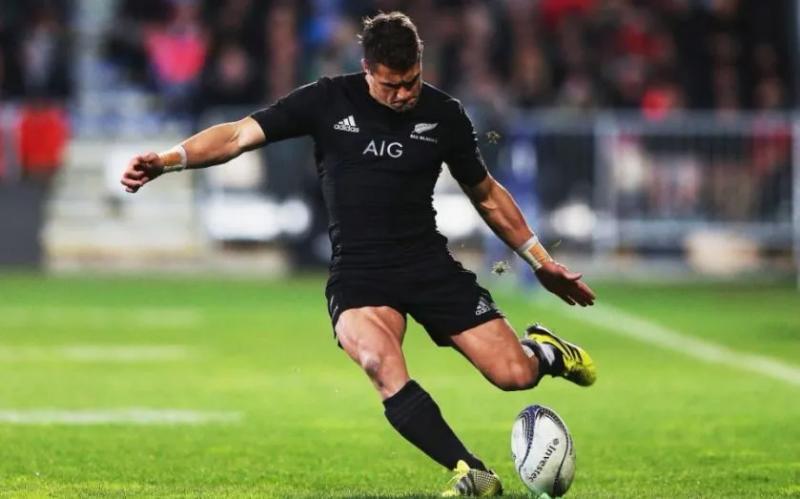
Skill and Talent: Dan Carter, often regarded as one of the greatest fly-halves in the history of rugby, possessed an extraordinary skill set and innate talent that set him apart in his position. His precision in kicking, both from hand and off the tee, was exceptional. Carter had the ability to accurately place kicks into space, set up try-scoring opportunities, and dictate the flow of the game with his tactical kicking. His playmaking abilities were nothing short of brilliant, with the vision to read the game, make split-second decisions, and execute them flawlessly. Carter's innate talent for orchestrating the attack, whether through pinpoint passes or well-timed kicks, made him a maestro on the field and a nightmare for opposing defenses. His skill and talent were the cornerstone of his remarkable career.
Impact: Dan Carter's impact on the sport is most evident in his pivotal role during New Zealand's Rugby World Cup victories in 2011 and 2015. In these tournaments, he was not merely a player but a linchpin of the All Blacks' success. Carter's ability to control matches, create scoring opportunities, and execute under pressure were instrumental in securing New Zealand's World Cup triumphs. His performances in crucial knockout matches, including the 2015 final, showcased his ability to rise to the occasion when it mattered most. Beyond the titles, Carter's influence extended to inspiring a generation of fly-halves and rugby players around the world, who sought to emulate his precise kicking and playmaking prowess. His impact on the game's global landscape is immeasurable.
Consistency: Dan Carter's remarkable consistency over a career that spanned more than a decade solidified his status as a rugby legend. Year in and year out, he maintained an exceptional level of play, consistently delivering outstanding performances for his club and country. This consistency was not limited to a single aspect of his game; it encompassed his kicking accuracy, tactical astuteness, defensive reliability, and overall influence on the field. Carter's unwavering dedication to excellence, coupled with his ability to sustain top-tier performance throughout his career, is a testament to his enduring legacy. His consistency not only earned the respect of teammates, opponents, and fans but also ensured his place as one of the all-time greats in the sport of rugby.
5. Gareth Edwards (Active: 1967-1978)
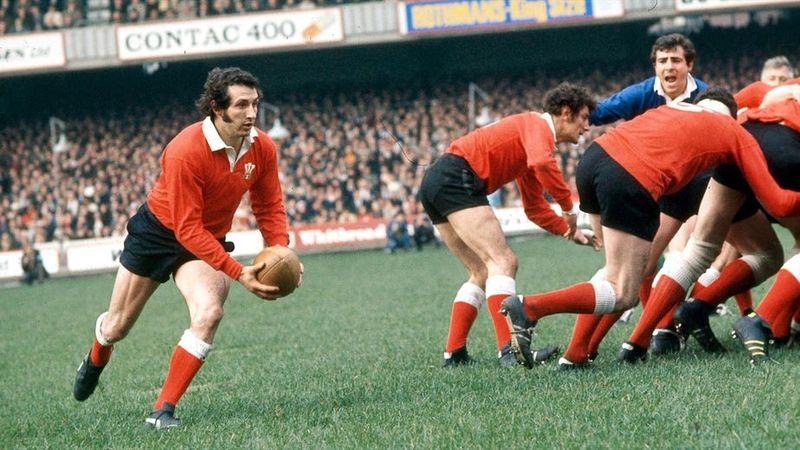
Skill and Talent: Gareth Edwards, a legendary scrum-half, was renowned for his exceptional skill and talent that made him an iconic figure in the world of rugby. His passing skills were nothing short of extraordinary; he had the ability to deliver pinpoint passes with unmatched precision, often setting up try-scoring opportunities for his teammates. Edwards possessed an innate tactical acumen that allowed him to read the game like few others. His decision-making and game management were impeccable, enabling him to control the tempo of matches. What truly set him apart was his vision; he had the remarkable ability to see and exploit gaps in the opposition's defense, making him a playmaker of the highest caliber. Edwards' skill and talent at the scrum-half position laid the foundation for his storied career.
Impact: Gareth Edwards' impact on rugby extended far beyond his individual achievements. His name is synonymous with Wales' success during an era of dominance in the Five Nations Championship, now the Six Nations. Edwards played a pivotal role in securing numerous Grand Slam victories for Wales, an achievement that solidified his place in rugby history. His legacy in the scrum-half position remains unparalleled; he set the standard for what a modern scrum-half should be – a combination of skill, vision, and game management. Edwards' influence inspired generations of scrum-halves who sought to emulate his passing prowess and ability to read the game. His impact on Welsh rugby and the scrum-half role is an enduring testament to his greatness.
Consistency: Gareth Edwards consistently performed at an elite level throughout his illustrious career. Whether in international matches, club contests, or during the British and Irish Lions tours, his standards never wavered. His ability to maintain exceptional form over an extended period is a hallmark of his career. Edwards' consistency provided a sense of stability and assurance to his teammates, knowing they could rely on his exceptional skills and decision-making in any situation. His enduring excellence as a scrum-half, season after season, is a testament to his dedication, work ethic, and innate talent. Gareth Edwards remains an exemplar of what it means to consistently perform at the highest level in the sport of rugby.
6. Brian O'Driscoll (Active: 1999-2014)
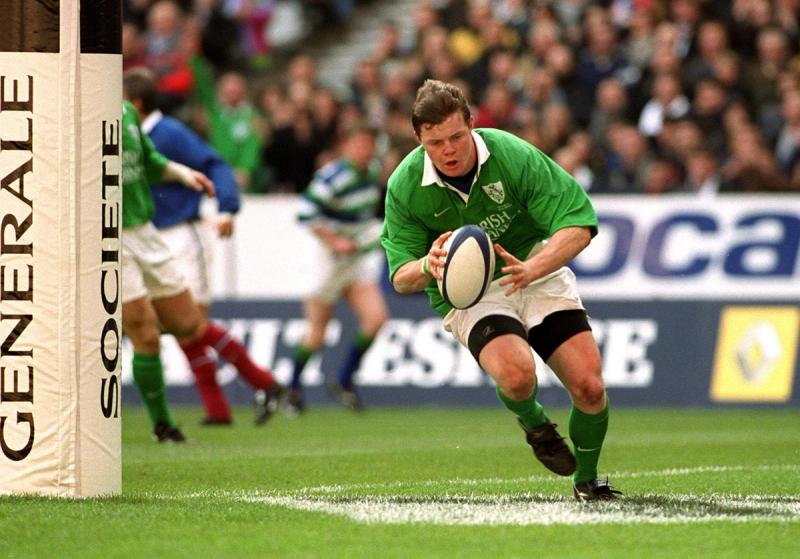
Skill and Talent: Brian O'Driscoll, a dynamic center, was celebrated for the exceptional skills and talents that made him one of the most revered figures in the world of rugby. His agility on the field was remarkable, allowing him to navigate through defenses with finesse and grace. O'Driscoll possessed an innate ability to read the game, and his vision was unparalleled. This vision enabled him to anticipate play developments, make split-second decisions, and create scoring opportunities for himself and his teammates. His try-scoring prowess set him apart; O'Driscoll had a knack for finding gaps in even the most formidable of defenses and was a consistent threat in the attacking line. His versatility allowed him to excel in both attacking and defensive roles, making him a complete center. His combination of skill, agility, and rugby intelligence defined his play.
Impact: Brian O'Driscoll's impact on the world of rugby extended far beyond his individual accomplishments. His contributions to Irish rugby were profound, and he played a pivotal role in elevating the national team's status on the international stage. O'Driscoll's leadership, both as captain and as a senior player, guided Ireland to multiple successes in the Six Nations Championship, including their historic Grand Slam victory in 2009—a feat not achieved in over six decades. His influence within the Irish setup was immeasurable, inspiring a new generation of Irish rugby players and instilling a sense of belief that anything was possible.Additionally, O'Driscoll's impact was keenly felt in the context of the British and Irish Lions. He was a key figure on several Lions tours, and his performances as captain and player helped the Lions secure victories in crucial test series, notably the 2013 series against Australia. O'Driscoll's leadership, experience, and exceptional play were instrumental in uniting players from different home nations under the Lions banner. His contributions resonated not only with his teammates but with rugby fans worldwide, as he showcased the unity and camaraderie that define the Lions' ethos.
Consistency: One of the defining characteristics of Brian O'Driscoll's illustrious career was his exceptional consistency. Season after season, match after match, he delivered performances of the highest quality. Regardless of the opposition or the stage, O'Driscoll maintained a standard of excellence that was the envy of many. His consistency was not limited to his individual play; it extended to his leadership and influence within the team. His dedication to excellence set the tone for those around him, and his unwavering commitment to the sport was an example to all. O'Driscoll's ability to consistently perform at an elite level throughout his career was a source of reassurance for teammates and fans alike. His legacy as one of rugby's all-time greats is not only built on his remarkable skills but also on his remarkable consistency.
7. Martin Castrogiovanni (Active: 2002-2016)

Skill and Talent: Martin Castrogiovanni, an Italian prop, was a dominant force in the scrum and a true embodiment of strength and technique in rugby's forward pack. His skill and talent primarily revolved around his prowess in the scrum. As a tight-head prop, Castrogiovanni possessed the technical expertise and raw power needed to anchor the scrum effectively. His ability to engage, stabilize, and drive the scrum forward was a crucial asset for both his club and the Italian national team. His strength, especially in the scrum, made him a formidable presence on the field, often overpowering his opposition and securing crucial set-piece advantages for his team. Castrogiovanni's skill and talent in the scrum were foundational to his success as a prop.
Impact: Martin Castrogiovanni's impact on the world of rugby is most evident in his significant contributions to Italian rugby. He played a vital role in the development and progress of Italian rugby during a period when the nation was striving to establish itself on the international stage. His influence extended beyond the individual matches he played; he was a symbol of determination and commitment for Italian rugby. Castrogiovanni's presence provided motivation and inspiration for his teammates and aspiring Italian players. His contributions helped raise the standard of Italian rugby, making the team a more competitive force on the global stage. His impact within the Italian rugby community solidified his status as a vital figure in the sport.
Consistency: Martin Castrogiovanni's consistency as a prop forward was a defining feature of his career. Over a span of more than a decade, he consistently delivered powerful performances in both domestic and international rugby. His ability to maintain a high level of play, particularly in the demanding position of prop, showcased his dedication to the sport and his physical conditioning. Castrogiovanni's consistent contributions were a source of reliability for his teams, knowing they could count on his scrummaging strength and work rate in every match. His unwavering commitment to excellence in the scrum and his overall consistency as a player established him as one of Italy's most reliable and enduring rugby talents.
8. David Campese (Active: 1982-1996)
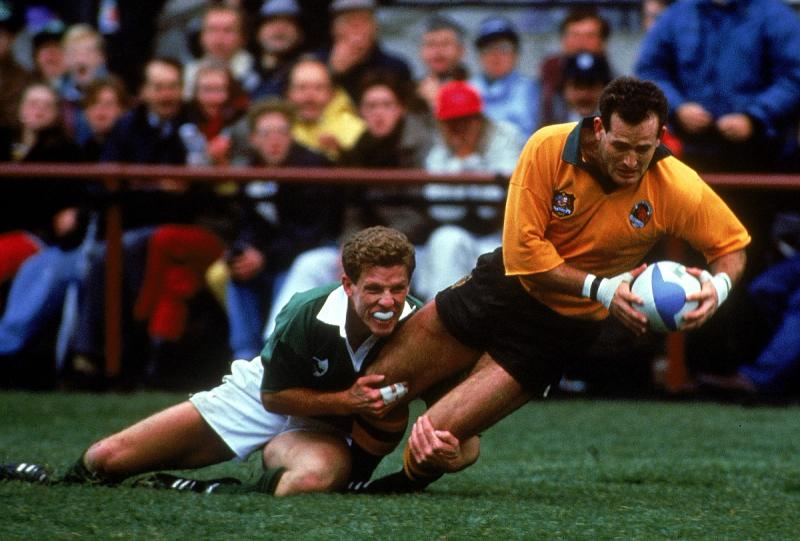
Skill and Talent: David Campese, an Australian winger, is celebrated as one of the most skillful and entertaining players in the history of rugby. His skill and talent were characterized by dazzling footwork, exceptional agility, and a flair for scoring remarkable tries. Campese's ability to change direction with lightning speed, leaving defenders grasping at thin air, was nothing short of mesmerizing. His extraordinary ball-handling skills, often showcased in intricate sidesteps and audacious chip kicks, set him apart from his contemporaries. Campese's vision on the field was also remarkable; he had an innate ability to read the game, anticipate play developments, and position himself perfectly to exploit opportunities. His try-scoring ability was legendary, and he had a knack for finishing moves in the most spectacular fashion. Campese's skill and talent made him a true showman of rugby.
Impact: David Campese's influence on the sport of rugby is immeasurable, with his unique style of play setting new standards for wingers worldwide. Campese was a trailblazer, redefining the role of wingers from being mere finishers to being integral playmakers. His willingness to roam around the field, pop up in unexpected places, and inject himself into the backline play revolutionized the way wingers approached the game. Campese's influence was not limited to his own team; he inspired a generation of wingers and backline players to embrace creativity, spontaneity, and flair in their play. His performances on the international stage, particularly during the 1984 Grand Slam tour and the 1991 Rugby World Cup, showcased his unique approach to the game and earned him a reputation as one of rugby's most iconic figures.
Consistency: David Campese's remarkable consistency is evident through his long and illustrious career. Over the span of more than a decade, he consistently delivered high-quality performances for Australia. His ability to maintain his dazzling form and inventive play over such a prolonged period is a testament to his dedication and passion for the sport. Campese's consistency was not limited to his individual brilliance; it extended to his adaptability and versatility on the field. Whether it was the tough encounters of test matches or the flair-filled moments of sevens rugby, Campese's unwavering commitment to excellence was a hallmark of his career. His long-lasting impact on the sport is a testament to the enduring legacy of his consistency and innovation in rugby.
9. Jean de Villiers (Active: 2002-2015)
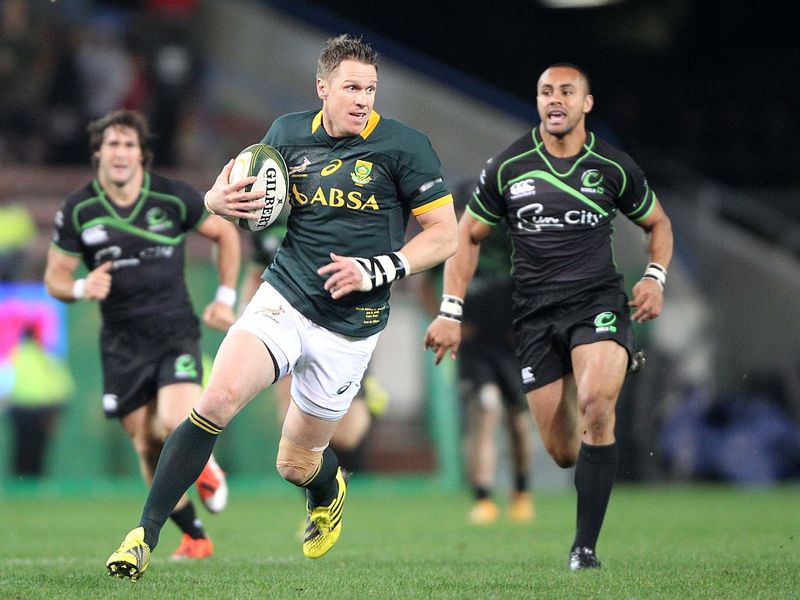
Skill and Talent: Jean de Villiers was a remarkable rugby player known for his exceptional skills and versatility on the field. As a center, he possessed a diverse skill set that included excellent ball-handling abilities, a keen rugby intelligence, and the capability to both attack and defend effectively. His versatility allowed him to adapt to various playing styles and situations, making him a valuable asset to any team he played for.
Impact: De Villiers' impact on the rugby world goes beyond his skills. He made a significant mark through his leadership qualities and contributions to South African rugby success. He was not only a talented player but also a respected captain who led by example. His leadership was instrumental in inspiring and motivating his teammates, contributing to team cohesion and success on numerous occasions.
Consistency: One of the standout features of Jean de Villiers' rugby career was his consistency. Throughout his international career spanning over a decade, he consistently delivered strong performances. This consistency was a testament to his dedication, work ethic, and commitment to the sport. Whether it was in defense, attack, or leadership, you could always count on De Villiers to give his best for his team.De Villiers' legacy in rugby extends beyond his playing days, as he continues to influence the sport through his insights as a rugby pundit and his involvement in various rugby development programs. His career is a shining example of how skill, leadership, and unwavering consistency can leave an indelible mark on the rugby world, making him a beloved figure among rugby fans worldwide.
10. Jonny Wilkinson (Active: 1998-2014)

Skill and Talent: Jonny Wilkinson, an English fly-half, is renowned for his exceptional skill and talent, particularly in his precise kicking and memorable drop goal in the 2003 Rugby World Cup final. Wilkinson's kicking ability was second to none. His precision in both place-kicking and tactical kicking made him a deadly accurate fly-half. Whether it was converting tries, slotting penalties, or executing well-placed kicks for territory, Wilkinson's boot was a potent weapon. His technique in striking the ball was meticulous, and he had the ability to maintain his composure even in high-pressure situations, making him a reliable kicker. Wilkinson's defining moment came in the 2003 Rugby World Cup final when he delivered a stunning drop goal in extra time, securing England's victory over Australia. This iconic moment not only showcased his incredible skill under pressure but also etched his name in rugby history. Wilkinson's skill and talent were not limited to kicking; he was also a capable playmaker, with the vision to set up his teammates and orchestrate the attack.
Impact: Jonny Wilkinson's impact on the sport of rugby is celebrated not only for his iconic drop goal but also for his enduring dedication to the sport. His memorable drop goal in the 2003 World Cup final stands as one of the most iconic moments in rugby history, a moment that delivered England their first and only World Cup victory. It symbolizes his ability to perform at the highest level when it mattered most and remains etched in the memory of rugby fans worldwide.Beyond that moment, Wilkinson's impact extended to his dedication and work ethic. He exemplified the values of discipline, commitment, and perseverance, becoming an inspiration to aspiring rugby players. His relentless pursuit of excellence, his meticulous preparation, and his ability to bounce back from injuries demonstrated his dedication to the sport. Wilkinson's professionalism and unwavering commitment to self-improvement made him a role model for not only rugby players but athletes across various disciplines.
Consistency: One of Jonny Wilkinson's most remarkable attributes was his unwavering consistency and dedication to rugby. He maintained a high level of performance throughout his career, spanning over a decade. Despite facing numerous injuries, he consistently returned to the field, showcasing resilience and determination. Wilkinson's consistency in kicking, playmaking, and defensive work made him an iconic figure in the sport. His teammates and fans knew they could rely on him to deliver in crucial moments. His dedication to maintaining his high standards of play season after season solidified his status as a rugby legend and an enduring symbol of excellence in the sport.
Conclusion
The top 10 greatest rugby players we've celebrated in this article have demonstrated an extraordinary combination of skill, impact, and consistency throughout their careers. Their enduring legacies continue to inspire rugby players and fans worldwide. As the sport of rugby evolves, the achievements and contributions of these legendary players will remain a testament to their greatness, ensuring their lasting places in the hallowed annals of rugby history.
Related

June 8th
The All Blacks: Contender for the Greatest Team Ever
In the realm of rugby, greatness is measured not just by trophies and titles but by the enduring legacy, consistency, and sheer dominance that a team exhibits over time.
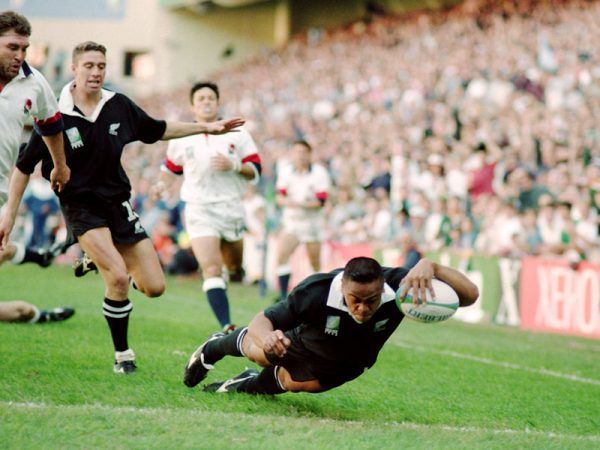
May 10th
The Top 10 Most Remarkable Rugby Moments of All Time
Rugby, a sport of skill, heart, and sheer brilliance, has given us unforgettable moments etched in the annals of its rich history.
